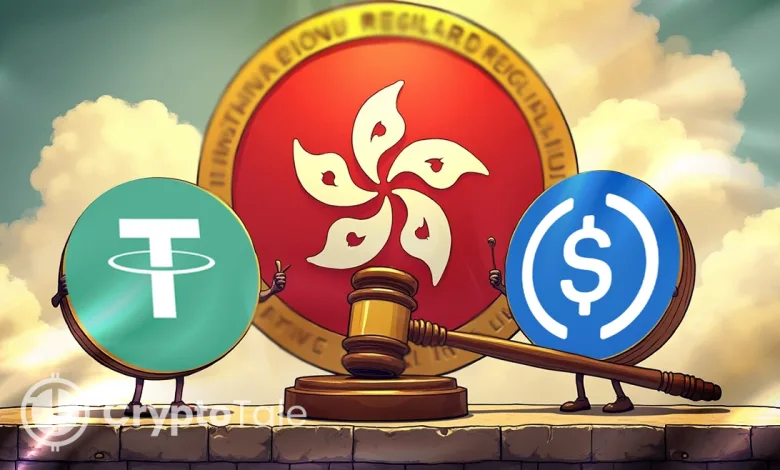Hong Kong to Ban Unlicensed Stablecoin Promotions From August 1

- Hong Kong’s new law makes it illegal to market unlicensed stablecoins to retail investors.
- Stablecoin issuers must secure an HKMA license to promote their products legally in Hong Kong.
- The HKMA warns the public about the risks of unlicensed stablecoin promotions in the market.
Hong Kong will soon ban unlicensed stablecoin marketing to the public as it prepares for the implementation of new regulations. The move is part of efforts to cool market enthusiasm and protect retail investors. Starting August 1, companies will need an official license to promote stablecoins to retail investors, tightening control over the growing digital asset sector.
Eddie Yue, Chief Executive of the Hong Kong Monetary Authority (HKMA), cautioned the public ahead of the new Stablecoins Ordinance. In a blog post, he highlighted concerns over market manipulation and fraud in recent stablecoin promotions.
Hong Kong Targets Unlicensed Stablecoin Issuers
The new law targets fiat-referenced stablecoins (FRS), making it illegal to offer them to retail investors without a valid HKMA license. Yue emphasized that many of the recent promotions bordered on deceptive practices that could mislead investors.
This regulatory update comes as the city sees a surge in companies seeking to enter the Web3 market. Over 40 firms have approached Hong Kong regulators in recent months, many eager to explore stablecoin opportunities. However, most of these firms are still in early stages, with some lacking solid business plans and risk management strategies.
Some of the major firms that have been preparing applications include the Ant Group, JD.com, Standard Chartered, and Circle. A number of law firms have reported an increase in the number of customers completing their applications. It is anticipated that the applications will be filed when the law becomes operational in August.
Yue cautioned that not every applicant is going to be licensed. He mentioned the announcements of some companies on their intention to pursue a stablecoin business. Such announcements normally create artificial market excitement in terms of rising prices and trading volumes of the stock. He warned investors to be cautious and decide wisely.
With the new regulations, stablecoins will need to be fully covered by high-quality and liquid assets. Such reserves may be in the form of cash, or as bank deposits or government bonds. The reserves are also to be kept in trust and cannot be mixed up with the company’s assets, so that the investors are not at risk of insolvency.
Global Crackdown on Stablecoin Regulation Intensifies
International regulators are also focusing on stablecoins. The Bank for International Settlements has raised concerns about money laundering risks. This is particularly relevant in cross-border transactions involving stablecoins. The United States has already passed new stablecoin legislation, signaling a shift toward global regulatory oversight.
Related: China Tech Giants Push for Yuan Stablecoins in Hong Kong
Hong Kong aims to become a digital asset hub in the Asian market as it balances innovation and regulation. HKMA is completing its policies regarding anti-money laundering and the prevention of financial crimes. By the end of July, these guidelines are expected to be published. The authority will also adopt a strict approach towards the protection of investors.
Regulations are becoming stricter in other jurisdictions in the world. The European Union’s Markets in Crypto-Assets (MiCA) regulation imposes financial penalties of up to €5 million for legal violations. In the UK, the Financial Conduct Authority has been struggling to enforce crypto-related rules, as only 50% of flagged illicit crypto advertisements have been removed.
As Hong Kong bolsters its regulatory system, it aims to provide an open path for businesses that wish to participate in the stablecoin market. Both investors and companies are keeping an eye on the city in preparation to define how they can redefine digital assets in the future.




